 W
WBai Renfu, also known as Bai Pu, was a renowned Chinese playwright of the Yuan Dynasty.
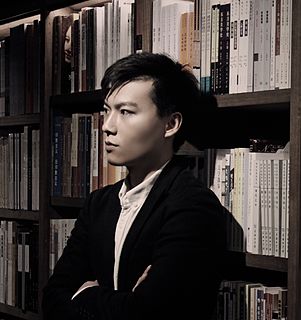 W
WChen Qiufan, also known as Stanley Chan, is a Chinese science fiction writer, columnist, and scriptwriter. His first novel was The Waste Tide, which "combines realism with allegory to present the hybridity of humans and machines". Chen Qiufan's short fiction works have won three Galaxy Awards for Chinese Science Fiction, twelve Nebula Awards for Science Fiction and Fantasy in Chinese. "The Fish of Lijiang" received the Best Short Form Award for the 2012 Science Fiction & Fantasy Translation Awards. His stories have been published in Fantasy & Science Fiction, MIT Technology Review, Clarkesworld, Year's Best SF, Interzone, and Lightspeed, as well as influential Chinese science fiction magazine Science Fiction World. His works have been translated into German, French, Finnish, Korean, Czech, Italian, Japanese and Polish and other languages.
 W
WDaoxuan was the Chinese Buddhist monk and patriarch of the Vinaya school, who wrote both the Continued Biographies of Eminent Monks and Standard Design for Buddhist Temple Construction. In legends he is attributed with the transmission of the Buddha relic called Daoxuan's tooth, one of the four tooth relics enshrined in the capital of Chang'an during the Tang dynasty. He is said to have received the relic during a night visit from a divinity associated with Indra.
 W
WFeng Jiren, known professionally as Fengzi, also known as Feng Fengzi, was a Chinese actress, writer, literary editor, and dramatist. Her second husband was the American-born translator Sidney Shapiro.
 W
WGāo Fènghàn was born in Shandong to a minor bureaucrat. He was a painter, poet, and seal-carver, and he later became associated with the Yangzhou school of painters. These painters were known as eccentrics for their unorthodox style and preference for individualism. Gāo Fènghàn is not usually considered of the eight Yangzhou eccentrics, but is associational. Like his father, he served a minor post in the bureaucracy, but this did not occur until 1739. In 1736, this job led to his imprisonment. The following year, injuries during his time in prison combined with arthritis to disable his right hand. After that he painted with his left. These paintings have since gained some renown among Chinese art collectors.
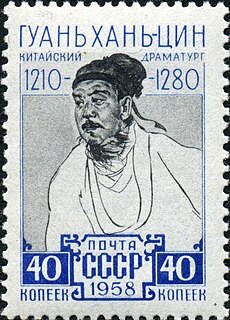 W
WGuan Hanqing, sobriquet "the Oldman of the Studio", was a notable Chinese playwright and poet in the Yuan Dynasty. He has been described as among the most prolific and highly regarded dramatists of the Yuan period.
 W
WHan Shaogong is a Chinese novelist and fiction writer.
 W
WHongzhi Zhengjue, also sometimes called Tiantong Zhengjue (1091–1157), was an important Chinese Chan Buddhist monk who authored or compiled several influential texts. Hongzhi's conception of silent illumination is of particular importance to the Chinese Caodong Chan and Japanese Sōtō Zen schools. Hongzhi was also the author of the Book of Equanimity, an important collection of kōans
 W
WLi Kaixian was a Chinese writer, playwright and literary critic of the Ming Dynasty. He was retired from the government at age 39, and then devoted his life to literature and Chinese opera. He was a member of the circle of intellectuals gathered folk songs and ballads. His first play Sword was a chuanqi play. The play is based on the plot of the novel Water Margin, but the story of Lin Chong had been changed.
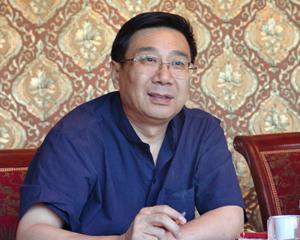 W
WLi Datong was the Managing Editor of Freezing Point, a section of China Youth Daily. He now writes for openDemocracy, which is based in London.
 W
WSu Xun was a Song dynasty writer, best known for his essays. He is considered one of the Eight Masters of the Tang and Song, along with his sons Su Shi and Su Zhe.
 W
WMa Jiliang, born Ma Jizong and better known by his pen name Tang Na, also known as Ma Shaoliang, was a Chinese writer. He was the second husband of actress Lan Ping, who after their divorce married Mao Zedong.
 W
WWang Menghan, also known as Tau Tau, is an author and film producer. She was born in Harbin and grew up in Shanghai. She lived in North Africa for many years and now she is living in Berlin.
 W
WZhou Wei Hui, known simply by her Chinese given name Wei Hui, is a Chinese Post 70s Generation writer, living and working in Shanghai and New York City. Her novel Shanghai Baby (上海宝贝) (1999) was banned in the People's Republic of China as "decadent". Her latest novel Marrying Buddha (我的禅) (2005) was censored, modified and published in China under a modified title. She is often associated with Mian Mian, another slightly older member of the "New Generation".
 W
WHao Wu is a Chinese-American film director, producer and writer. Wu was also a blogger known as Tian Yi. He is best known for his feature-length documentary, People's Republic of Desire, winner of the Grand Jury Award for Best Documentary Feature at the 2018 South by Southwest, and All in My Family, a Netflix Original Documentary.
 W
WWu Jianren, also known as Wu Woyao was a Chinese writer of the late Qing period. A native of Foshan, Guangdong province, he is known for several novels, namely Bizarre Happenings Eyewitnessed over Two Decades and The Sea of Regret. Wu Jianren published one of the earliest modern Chinese novel in the 19th century. He is a representative of modern Chinese novel for two reasons, time and his technique. The time he posted his modern Chinese novel is ahead Lu Xun at least one decade, and his technique about narrator and centralized character is ahead of other novels that written in the same time. Wu Jianren wrote the most articles in the group of writers who answered Liang Qichao's call. His novel 《二十年目睹之怪现状》(Bizarre Happenings Eyewitnessed over Two Decades) and 《九命奇冤》(strange grievance case of nine lives) has deeply affected modern Chinese novel.
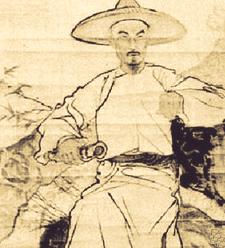 W
WWu Jingzi was a Chinese scholar and writer who was born in the city now known as Quanjiao, Anhui and who died in Yangzhou, Jiangsu. Wu Jingzi is the author of a famous satirical novel titled Rulin waishi or The Unofficial History of the Scholars.
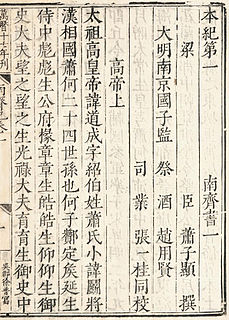 W
WXiao Zixian, courtesy name Jingyang (景陽), formally Viscount Jiao of Ningdu (寧都驕子), was a historian and author, best known for producing the Book of Qi.
 W
WYe Yonglie was a Chinese writer of science fiction and biographies. A few of his stories have been translated into English in The Road to Science Fiction series and elsewhere. During the "Anti-Spiritual Pollution Campaign" his works were attacked and a story he wrote in 1985 was suppressed for suggesting AIDS had entered the country. As a biographer he wrote on early figures in the People's Republic of China. He also visited North Korea, and wrote a book The Real DPRK (真实的朝鲜) which was banned in that country and China.
 W
WYuanwu Keqin (1063–1135) was a Han Chinese Chan monk who compiled the Blue Cliff Record.
 W
WZhang Yueran is a Chinese writer.
 W
WZhu Shouju, born Zhu Junbo, also known by his pen name Haishang Shuomengren, was a Chinese author and filmmaker based in Shanghai.